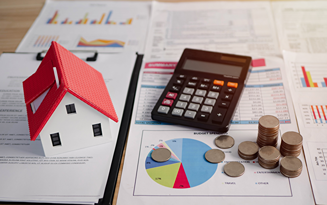What Deposit is Needed for Commercial Property in Australia?

Investing in commercial property is a great way of getting a high return on your money compared to residential property. However, commercial property is also seen as a higher risk investment due to the complexity involved with getting a deposit in place to secure finance.
But how much of a deposit do you need for commercial property? Typically speaking, you’ll need between 20% – 35% of the property value, but there are factors that can influence this percentage quite dramatically.
In this guide, we’ll be looking at these factors and providing you with all of the information needed to help make understanding deposits for commercial property a lot easier.
What Factors Can Influence Commercial Property Deposits in Australia?

Size & Type of Commercial Property
Location and Market Conditions
Loan Types & Lenders
Risk & Borrowers Financial Health
Are There Any Ways You Can Lower Your Commercial Property Deposit?

Remember, security property finance is a two-way street, and you aren’t always tied into the first option you come across. In fact, there are several ways in which you may be able to lower the required deposit when buying commercial property.
Firstly, engage in negotiations with the seller or their agent. Sometimes, a seller may be willing to accept a lower deposit if you can offer other terms or conditions that they find favourable, such as a quick settlement or fewer contingencies.
It is also a good idea to research different lenders and compare their deposit requirements, as some financial institutions may offer a lower deposit based on your financial profile or the type of commercial property you’re buying.
You may also be able to lower your deposit by offering additional security, such as other assets or guarantees, as this helps to mitigate the risk for the seller or lender.
What Type of Security Can I Use?

There are several types of security you can use when buying commercial property or trying to get a commercial property loan. The most common is a cash deposit, which involves the buyer providing a portion of the purchase price in cash, which is held in a trust until settlement.
You can also offer a bank guarantee as security. This is a promise from your bank that the buyer will fulfill their obligations under the purchase agreement, and if the buyer defaults, the bank guarantees they’ll pay the seller a specified amount.
In some cases, you can offer a property or other valuable asset as security against the deposit. This could involve placing a mortgage on another property, which will massively increase your chances of securing a deposit for the commercial property purchase.
Negotiation Strategies for Deposit Terms with Lenders

As we mentioned above, it is sometimes possible to negotiate with sellers and lenders to create deposit terms that are favourable for both of you, and there are a few ways you can do this.
One of the most effective negotiation strategies at your disposal is demonstrating your financial stability. Provide financial statements that show you hold a strong financial position, have a stable income, and have a good credit history. Lenders are more inclined to negotiate deposit terms with borrowers who pose a lower risk.
You can also negotiate by offering additional collateral in order to secure your funds, such as a security property or other valuable asset. Knowing that there is backup in place may convince some lenders to lower their deposit requirements.
It’s sometimes possible to leverage your relationship with the lender as well, and if you have secured finance from them before and have a history of timely payments, you may be able to negotiate more favourable terms.
Remember, we’re here to help you at every stage of the journey, from helping explain each process involved with commercial property deposits to negotiations.
Book a 15-minute no-obligation call with our expert team today, and we’ll walk you through everything you need to know, talk about your next options, and make getting on the commercial property investment ladder as easy as possible.
Tips for Managing & Saving for Deposit Requirements

Managing and saving deposit requirements for a commercial property involves disciplined financial planning and a strategic approach. That may sound pretty scary, but there are some realistic ways of making getting your deposit together achievable.
One of the best things you can do is create a budget and stick to it! Assess your income, expenses, and financial goals to keep track of your spending and identify areas where you can cut costs and save money. It’s also a good idea to set yourself a savings goal with a specific amount and timeframe in mind.
You can make saving for a deposit almost effortless by setting up automated savings with your bank, too. This will take a set chunk of money from your income to a separate savings account and, over time, everything will add up.
Wherever possible, try to limit your debt and credit usage, as well. High-interest debts, in particular, can soon eat into your potential savings. More importantly, however, having more credit available makes you more of a desirable candidate for finance, so doing this will help when it comes to securing the rest of the money for the commercial property.
